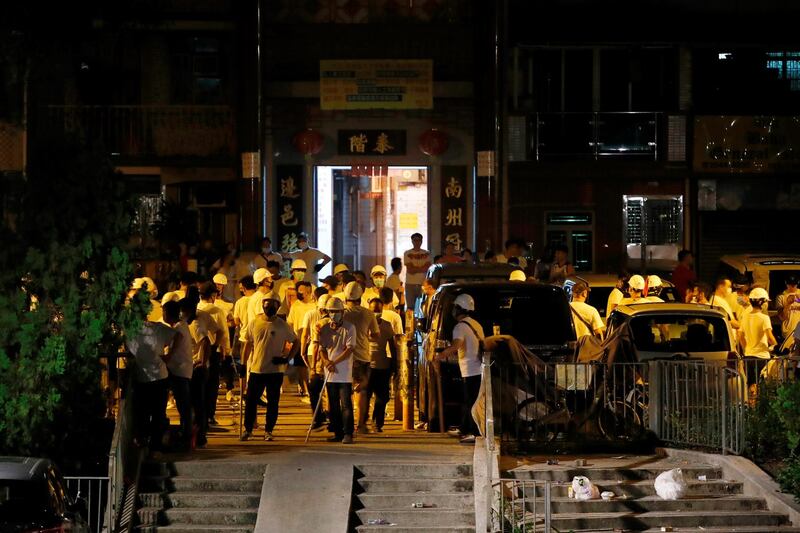Hong Kong government officials knew in advance that white-clad mobsters planned to attack protesters and passers-by at the Yuen Long train station on July 21, 2019, according to a new book about the democracy movement.
When dozens of unidentified thugs in white T-shirts attacked train passengers and passers-by with wooden and metal poles that day, police were inundated with emergency calls, but didn't move in until 39 minutes after the attacks began.
Now, a recently published account says police knew about the attacks before they started.
"It was not the first the police had heard of the brewing attacks," write former Washington Post Hong Kong correspondent Shibani Mahtani and The Atlantic writer Timothy McLaughlin in "Among the Braves."
Members of Hong Kong's criminal underworld "triad" organizations had been discussing the planned attack for days on a WhatsApp group that was being monitored by a detective sergeant from the Organized Crime and Triad Bureau, the book says.
"He had managed to gain access to the WhatsApp group chat, giving him unfettered insight into the plans, even before rumors reached the residents of the neighborhood," it says, adding that the attack had unified rival gangs in a "singular purpose," with their allegiance suggested by the Chinese national flags they carried at the time of the attack.
The book says that then-Chief Executive Carrie Lam was following the news on TV, rather than by following live streamed video, the protester forum LIHKG or protest-related channels on Telegram, at the time. It also says that one of her officials only found out via social media when she visited the bathroom and picked up her phone, which had been placed outside for security reasons.
‘Wear only white’
It adds that officials from Lam's administration had been rubbing shoulders and eating roast suckling pig alongside some of the attackers only the day before.
"The government already knew who some of the men were," the authors write, citing the attendance of government political assistant Kenneth Ng at a banquet in a rural village in Yuen Long the day before the attacks came.

"There was some overlap between the membership of these rural political bodies and of the triad societies ... [which] provided muscle to the rural committees, intimidating and strong-arming opponents," according to Mahtani and McLaughlin.
The Times newspaper later went on to identify one of the banquet attendees among the July 21 attackers on journalist Gwyneth Ho's live stream from Yuen Long MTR – naming him as Stephen Ng, they write.
"The government officials attending these celebrations ahead of the attacks offered hints that they knew what was about to unfold," the book says.
"The political assistant to the secretary for mainland affairs had invited some others to join him at the banquet on July 20," the authors say.
"He gave them a very specific dress code: Wear only white."
‘Criminal cops’
HK01.com reported at the time that staff at the Constitutional and Mainland Affairs Office set up a Lennon Wall in their office to protest the government's handling of the attacks.
While active coordination between the triads and police was never proven, the attacks, and the relatively light touch applied to the attackers compared with black-clad protesters, sparked a wave of public anger at the police force, who started to get heckled as "hak ging," or "criminal cops," on the streets.
"The police knew, and they did nothing," Mahtani and McLaughlin write. "Many police officers outright sympathized with the men in white."
"On WhatsApp groups, frontline officers in unrelated units praised the men in white for 'teaching the kids a lesson' ... [believing] that all the victims were protesters and legitimate targets," the book says.
The weeks and months after the attack saw a massive wave of public anger at the police, who were later seen as legitimate targets for doxxing and even violent attacks.
But instead of investigating the incident, Lam rejected any allegations of collusion, and later quashed a full report from the city's police supervisory body on the handling of the protests.
The book also takes aim at the ruling Chinese Communist Party's insistence that the 2019 protests were an attempt by " hostile foreign forces" to foment an uprising against the government in Hong Kong.
"There was no foreign interference behind the protests," Mahtani and McLaughlin write.
"They were locally driven, planned, and organized," they say, citing their own experience covering the protest movement on the ground.
"We never saw American men in sunglasses hand over wads of cash to demonstrators, contrary to the caricature put out by Beijing," the authors write.
"The movement was entirely a manifestation of Hong Kong's will, sparked by Lam and her mishandling of the extradition bill, and then fueled by the police's unconstrained use of force," it says, in a reference to Lam's plans, later withdrawn, to allow the extradition of people deemed criminal suspects to face trial in mainland China.
Translated by Luisetta Mudie. Edited by Malcolm Foster.
